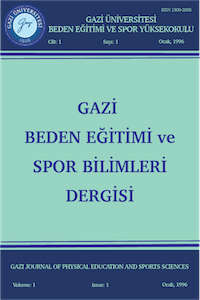Abstract
Oluşturulmuş alkalozun
yorucu egzersiz performansına etkisinin araştırıldı¤ı bu çalışmaya 20 elit güreşçi
denek katıldı. Denekler deney (n=10) ve kontrol (plasebo) (n=10) olmak üzere
iki gruba ayrıldılar. Deneklerin yaş ortalamaları 23.10±2.08 yıl, boy
ortalamaları 173.50±9.61 cm ve vücut a¤ırlı¤ı 78.30±14.80 kg olarak belirlendi.
Denekler çalışma sırasında bisiklet ergometrede 2 dk’lık boş yükte yapılan ısınmadan
sonra maksimal oksijen tüketimi de¤erleri baz alınarak bulunan maksimal iş
yükünün %125’ i ile 60 devir / dk pedal sayısında yorulana kadar çalıştılar. Denekler
bu testi birer hafta ara ile iki kez yaptı. Birinci denemede bütün denekler
herhangi bir madde verilmeden teste tabi tutuldular. ‹kinci denemede ise deney
grubu deneklere egzersizden iki saat önce 0.25 gr / kg vücut a¤ırlı¤ı dozajında
sodyum bikarbonat (NaHCO3) , kontrol grubu deneklere ise plasebo madde
verildikten sonra test yaptırıldı. Venöz kan örnekleri, plasebo veya NaHCO3 alımından 2 saat sonra
(egzersiz-den hemen önce) ve egzersizden 5 dk sonra alındı. Çalışmada elde
edilen verilerin aritmetik ortalamaları, standart sapmaları ve ölçümler arasındaki
farklılıklar 2 x 2 ReANOVA metodu ile P < 0.05 anlamlılık seviyesinde
hesaplandı. Ayrıca veriler arasındaki farkın hangi parametreden kaynaklandı¤ı
da Tukey Testi ile belirlendi. Çalışma sonucunda NaHCO3 alımının yorucu egzersiz
performansının artmasında etkili oldu¤u belirlenmiştir (p<0.05).Ayrıca
sonuçlar sodyum bikarbonat alımının egzersiz öncesi kan HCO3 ve pH seviyesini anlamlı
oranda arttırdı¤ını (p<0.05) göstermiştir. Bikarbonat denemesinin egzersiz
sonrası laktat seviyesi plasebo denemesinden anlamlı derecede yüksek
(p<0.05) ve pH seviyeside anlamlı derecede düşük olarak belirlendi
(p<0.05).
References
- 1. Astrand, P.O., Rodahl, K.C. (1996): Textbook of Work Physiology. McGraw-Hill Co., New York, 112 – 115, 321.
- 2. American College of Sports Medicine : Recommended Quantity and Quality of Exercise for Developing and Maintaining Fitness in Healthy Adults ,s.18-22, 1989.
- 3. Babalık, A. (1991): Bikarbonat Yüklemenin Yüksek Yoğunluktaki Egzersiz Performansına Etkisi, M.Ü., Sağlık Bilimleri Enstitüsü, Beden Eğitimi ve Spor Anabilim Dal›, Doktora Tezi, İstanbul.
- 4. Bouissou, P., Defer, G., Guezennec, C.Y., Estrade, P.Y., Serrier, B. (1988): Metabolic and Blood Catecholamin Responses to Egzercise During Alkalosis. Medicine and Science in Sports and Exercise, 20 (3), 228-232.
- 5. Brien, D.M., Mc Kenzie, D.C. (1989): The Effect of Induced Alkalosis and Asidosis on Plasma Lactate and Work Output in Elite Oarsmen, Eur. J. Appl., Physiology, 58 (8): 797-802.
Abstract
This study was done to investigate the effect of induced alkalosis on exhaustive exercise performance of 20 elite wrestlers. Mean age of the subjects was 23.10±2.08 years, mean height was 173.50±9.61 cm and mean body weight was 78.30±14.80 kg. The subjects were divided into experimental (n=10) and control (placebo) group (n=10) and they participated to two exercise sessions with one week interval. Each exercise session involved 125 % of maximum work load of subjects that was determined by taking VO2 max as a base with 60 rpm after two min warm-up unloaded cycling on cycle ergometer until they were exhausted. In the first session subjects did not take any substances before the exercise. In the second session experimental group took sodium bicarbonate equal to 0.25 gr/kg body weight and control group took only placebo drink two hours before the exercise.
Venous blood samples were taken two hour after ingestion (before the exercise) and 5 min following the exercise. Mean, Standart Deviation scores and differences between the datas were determined by ReANOVA test at p<0.05 significance level and source of differences between values were determined by using Tukey Test..Results indicated that NaHCO3 ingestion was effective to increase the exhaustive exercise performance significantly (p<0.05). Also the results showed that NaHCO3 ingestion facilitated to increase pre-exercise HCO3 and pH level of blood significantly (p<0.05). Moreover post-exercise lactate level of bicarbonate treatment significantly higher (p<0.05) and pH level significantly lower (p<0.05) than placebo treatment.
References
- 1. Astrand, P.O., Rodahl, K.C. (1996): Textbook of Work Physiology. McGraw-Hill Co., New York, 112 – 115, 321.
- 2. American College of Sports Medicine : Recommended Quantity and Quality of Exercise for Developing and Maintaining Fitness in Healthy Adults ,s.18-22, 1989.
- 3. Babalık, A. (1991): Bikarbonat Yüklemenin Yüksek Yoğunluktaki Egzersiz Performansına Etkisi, M.Ü., Sağlık Bilimleri Enstitüsü, Beden Eğitimi ve Spor Anabilim Dal›, Doktora Tezi, İstanbul.
- 4. Bouissou, P., Defer, G., Guezennec, C.Y., Estrade, P.Y., Serrier, B. (1988): Metabolic and Blood Catecholamin Responses to Egzercise During Alkalosis. Medicine and Science in Sports and Exercise, 20 (3), 228-232.
- 5. Brien, D.M., Mc Kenzie, D.C. (1989): The Effect of Induced Alkalosis and Asidosis on Plasma Lactate and Work Output in Elite Oarsmen, Eur. J. Appl., Physiology, 58 (8): 797-802.
Details
| Subjects | Sports Medicine |
|---|---|
| Journal Section | Articles |
| Authors | |
| Publication Date | July 7, 2002 |
| Submission Date | April 7, 2002 |
| Acceptance Date | June 7, 2002 |
| Published in Issue | Year 2002 Volume: 7 Issue: 3 |
Gazi Journal of Physical Education and Sports Sciences is a scientific and peer-reviewed journal published quarterly.


